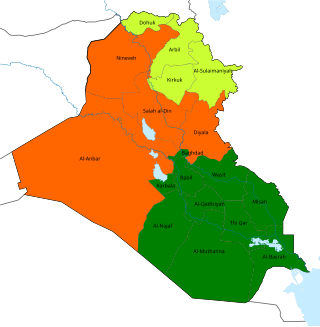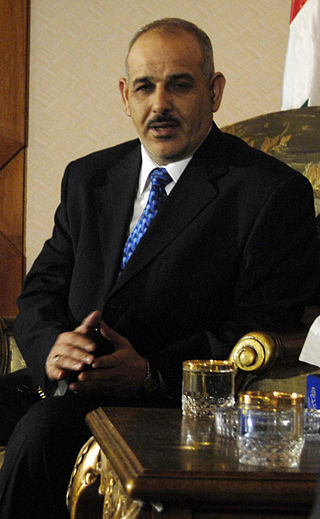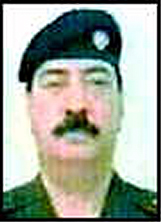Iraq is a federal parliamentary representative democratic republic. It is a multi-party system whereby the executive power is exercised by the Prime Minister of the Council of Ministers as the head of government, the President of Iraq as the head of state, and legislative power is vested in the Council of Representatives.

Ayatollah Abdul Aziz al-Hakim was an Iraqi theologian and politician and the leader of Islamic Supreme Council of Iraq, a party that has approximately 5% support in the Iraqi Council of Representatives. He also served as the President of the Governing Council of Iraq

Ayad Allawi is an Iraqi politician. He served as the vice president of Iraq from 2014 to 2015 and 2016 to 2018. Previously he was interim prime minister of Iraq from 2004 to 2005 and the president of the Governing Council of Iraq in 2003.
The Iraqi High Tribunal (IHT), formerly the Iraqi Special Tribunal and sometimes referred to as the Supreme Iraqi Criminal Tribunal, is a body established under Iraqi national law to try Iraqi nationals or residents accused of genocide, crimes against humanity, war crimes or other serious crimes committed between 1968 and 2003. It organized the trial of Saddam Hussein and other members of his Ba'ath Party regime.

The National Iraqi Alliance, also known as the Watani List, is an Iraqi electoral coalition that contested the 2010 Iraqi legislative election. The Alliance is mainly composed of Shi'a Islamist parties. The alliance was created by the Supreme Council for Islamic Revolution in Iraq to contest in the January 2005 and December 2005 under the name United Iraqi Alliance, when it included all Iraq's major Shi'a parties. The United Iraqi Alliance won both those of elections however later fell apart after several major parties left the alliance due to disputes with Prime Minister Nouri al-Maliki and the Supreme Council.

Parliamentary elections were held in Iraq on 15 December 2005, following the approval of a new constitution in a referendum of 15 October.
The Iraqi National List was a coalition of Iraqi political parties who ran in the December 2005 Iraqi elections and got 8.0% of the vote and 25 out of 275 seats.

Jawad al-Bulani served as the Interior Minister of Iraq within the Council of Ministers under Iraqi Prime Minister Nouri al-Maliki from 8 June 2006 to 21 December 2010. Bulani is a Shi'a independent member of the United Iraqi Alliance.
Sami al-Askari is an Iraqi politician and member of the Iraqi National Assembly, elected from the State of Law political coalition During the regime of Saddam Hussein he was active in exile opposition politics, joining the 1992 Executive Council of the Iraqi National Congress as a representative of the Islamic Dawa Party. In 2003, al-Askari joined the Iraqi Reconstruction and Development Council (IRDC) led by Emad Dhia and worked for Coalition Provisional Authority (CPA) Central Baghdad office as Media Spokesman. He was a member of the committee that drafted the Constitution of Iraq. In 2009, al-Askari was involved in the handover of British hostage Peter Moore to the Iraqi government authorities. Moore was later returned to the UK.
The government of Iraq has established a committee to consider a proposed amendment to the Constitution of Iraq.

Mohammed Younis al-Ahmed al-Muwali aka Khadr al-Sabahi is a former senior member of the Iraqi Ba'ath Party. Ahmed currently has a million dollar bounty placed on his head as one of Iraq's most wanted men accused of funding and leading resistance operations. He is the leader of al-Awda; an underground Ba'athist movement in Iraq.
Ammar al-Saffar was the Deputy Health Minister of Iraq from 2003 until his kidnapping and likely death in 2006. On November 19, 2006, he became the highest-ranking Iraqi official to be kidnapped when he was seized by men in police uniforms.

Established in 1920, the Ministry of Justice of Iraq (MoJ) is the federal government ministry concerned with judicial and prosecutorial training, publishing the Official Gazette, notaries public, deeds and records, and since 5 June 2004, prisons. In 2007, the ministry possessed a staff of 13,619. Also, 130 courthouses and headquarters are located at the Ministry of Justice Building.
Douglas Aziz Shamasha Eshaya is an Iraqi former football player and caretaker coach. He represented the Iraq national team, and is ethnically Assyrian.

The College of Science is one of the Colleges of the University of Baghdad in Baghdad, Iraq. It was the first scientific college established in Iraq. The main academic activities held in this college vary between pure and applied science. Beside its eight departments, the college also holds two research units. Being one of the earliest academic institutes formed in the Republic of Iraq, the College of Science establishment marked the . This college was established on March 27, 1949, with the name of. The college was established with five scientific departments, namely:. The Pathology and Anatomy departments were later joined together to form the. Beside these, another four departments were added during the next fifty years, these are: Department of Geology (1953), Department of Computer Science (1983), Department of Astronomy (1998) and Department of Biotechnology (1999). The eight departments cover a wide range of branches of pure and applied sciences, which attracts many students as well as scientific researchers each year. Therefore, this college is considered as the largest scientific academic institute in the Republic of Iraq.
Al-Ali is a group of Arab clans who are not necessarily from a common ancestor but were once rulers of their own Arab state in Southern Persia and are still influential in Iraq and the United Arab Emirates as they are the ruling family in Umm al-Quwain. Many of whom are from an Arab tribe, a branch of Bani Malik from Central Arabia. Bani Malik are named after the renowned army leader, Malik Al-Ashtar Al-Nakha'i, and are a branch of Azd Mecca. Azd Mecca are one of four branches of Azd, a major pre-Islamic tribes, a branch of Kahlan which was one of the branches of Qahtan the other being Himyar. Most of Al-Ali tribe migrated by the end of the 16th century from what is now Saudi Arabia to different neighboring countries. Members of Al-Ali tribe live in Saudi Arabia, UAE, Qatar, Kuwait, Bahrain, Iraq and Jordan.

A Bullet in the Heart is a 1964 Egyptian comedy play written by Tawfiq El-Hakim and directed by Kamal Hussein. It is based on Tawfiq El-Hakim's play with the same name. It stars Salah Zulfikar. This play is one of three plays of El-Hakim, in which the conclusion was open and unconvincing in that way, and it was Salah Zulfikar's theatrical debut.








